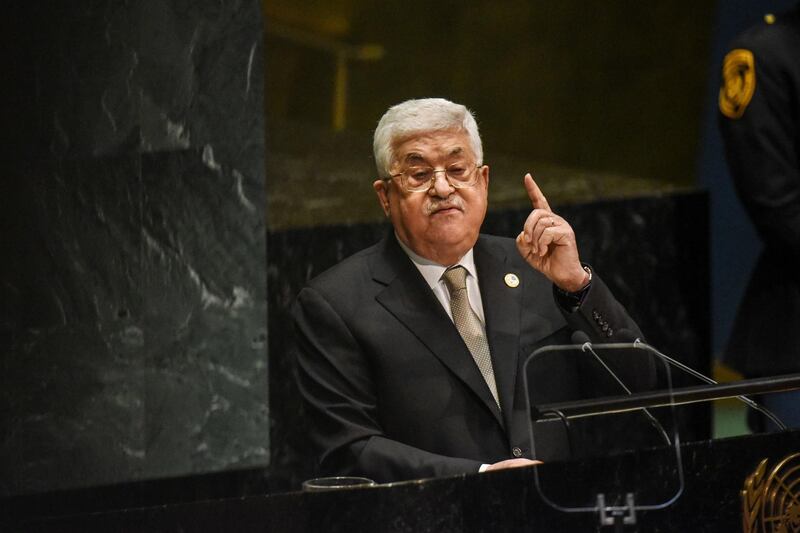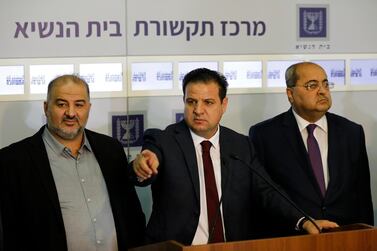Palestinian President Mahmoud Abbas on Thursday urged Israel to enter peace talks under a new government, saying Prime Minister Benjamin Netanyahu represented a roadblock to a negotiated solution.
Mr Abbas spoke at the United Nations General Assembly in New York, in an address coinciding with talks in Jerusalem over who will lead the country after a second election this year left major parties deadlocked.
Although Israel's president has tasked Mr Netanyahu with forming a government, the incumbent won fewer seats than his main rival Benny Gantz and faces a huge task in persuading other parties to join him in a coalition that commands majority support.
Mr Netanyahu is also facing potential corruption charges.
Mr Abbas said he was ready to talk with Israel under an international process aimed at ending the occupation and creating a separate Palestinian state.
“We have never missed an opportunity to hold serious negotiations with the Israeli side,” he said, referring to offers, most recently from Russia, to start talks aimed at finally resolving the more than seven-decade-old conflict.
“We have constructively engaged with all initiatives. Mr Netanyahu, has he ever agreed to negotiations, behind closed doors on a multilateral basis he never accepted any negotiations. We have both received several invitations to start the process. He has rejected those. They say 'Palestine doesn't want peace or negotiations'.
“We say we always extend our hand to peace because we are convinced that peace will only be achieved through negotiations.”
Despite the Israeli premier’s resistance, Mr Abbas said he was renewing his call for an international peace conference – an idea he first floated to the UN Security Council in February last year – involving Israel, Arab powers, and the Quartet on Middle East Peace that comprises the US, Russia, the European Union and the UN.
Such talks are the only way to achieve peace, the Palestinian leader said, rejecting the Trump administration’s unilateral approach, the so-called “deal of the century”, which the US has been promising to release for more than a year.
“We reject any negotiations shepherded by one country, and you all know this one country,” Mr Abbas said in a 23-minute speech to world leaders and diplomats.
There is as yet no indication that Mr Gantz, a former soldier accused of war crimes during the 2014 Israeli assault on Gaza that killed more than 2,000 Palestinians, would support Mr Abbas's initiative.
However The Joint Arab List that ran in Israel's elections has endorsed Mr Gantz for prime minister, such is its wish to get rid of Mr Netanyahu.
Mr Abbas also used the UN podium to denounce how the Israeli prime minister had used the recent polls to further jettison any prospect of a separate Palestinian state.
“He came out to arrogantly announce that should he prevail in the election, he would annex and apply Israeli sovereignty to the Jordan Valley, the Dead Sea and Israel's colonial settlements despite the fact that all these areas are occupied Palestinian territory,” he said.
“We reject entirely and completely this illegal plan.”
The Palestinians have struggled to match their claim for an officially recognised sovereign state with such status. Even though members of the UN overwhelmingly back the Palestinian right to statehood, it is classed as an Observer at the New York home of global diplomacy, a status upgrade it received in 2012.
Mr Abbas reiterated the call for a state based on the 1967 borders, along with a “just and lasting solution to the question of Palestinian refugees”, alongside the State of Israel, noting that Palestine is acknowledged as a country by 140 nations.
“It continues to assume its responsibilities at the regional and international level, as a resilient and constructive member of the global family and deserves to be a full member of the United Nations and all of its bodies and agencies,” Mr Abbas said of Palestine.






